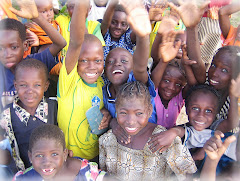A student named Ibrahim answered his phone during the middle of my class for children’s workers. Not bothering to quiet his voice, he remained seated at his place in the middle of the classroom, apparently oblivious to the disruption he was causing. Unable to continue my teaching, I marched up to him, demanded, “What are you doing?!”, ripped the cell phone out of his hand, overturned a chair, and demanded that he leave the classroom.
Not realizing that I’d talked to Ibrahim before class and asked him to participate in this illustration, most of the students in the class were shocked. They were definitely relieved to find out we were just acting.
But Jesus was not acting when He did something similar in the Temple—overturning the tables and chasing the money changers from the Temple. He was truly angry. But this was nothing in comparison to His anger when the disciples told the children to leave Jesus alone. The Greek word for Jesus’ reaction is the strongest word in the Bible that describes His anger. Jesus loved the children and was furious that someone would try to separate them from Him.
That was the point of my outburst in the classroom. I wanted the children’s workers see how passionately Jesus loves children and to catch that same love. Many of the students are well on their way. These thirty students make up the first class in the first children’s ministry school in Burkina Faso. This nine-month program is organized by the Go to Nations team, who has asked me to teach some of their courses.
In a country where the choice to be a children’s worker means a choice to be disrespected, to settle for a low salary, and often to work alone, it is amazing to see the hearts of people who are willing to do it. Right now I am blessed to say that we have a small group of people considering working full-time with CEF of Ouagadougou.
After working alone for so long, this came as a surprise. But I suppose it shouldn’t have. Look at how much Jesus loves children. I know it’s His heart’s desire for each of the children of Burkina Faso to know Him. Now it’s just a matter of seeing when and how He will get His beautiful message of salvation to these ones He loves infinitely.




